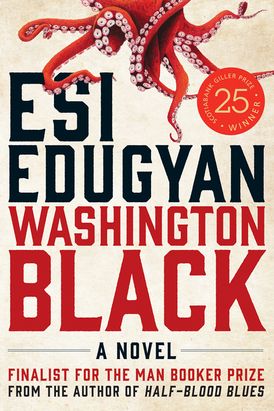This is an expanded version of the review I posted to Patreon earlier this month. If you want to support my work and read early versions of many of my projects, you can join the community here!
Content note: talking about racism and white supremacy
For the first time in… I don’t even know how long!… I finished a substantial novel in a week. That novel was Esi Edugyan’s Washington Black.
There were a few factors that made it possible, and I want to acknowledge that this isn’t always possible (for me or for anyone else dealing with a notable lack of time). The most important factor was that I spent a lot of time in the passenger seats of cars, so I had a solid 10 hours to read. I also decided to devote some time on the weekend to reading, so I spent a few hours in coffee shops reading when I could have been working instead.
It meant the next week was a bit stressful, and now two weeks out from it I’m still trying to get caught up on some of the work I put off, but it was worth it.
Washington Black by Esi Edugyan was so very worth it.

If you have the chance to read this book, take it. And be prepared to be pulled into this world, which contains so much nuance and life and depth and joy and pain.
I’m working through Layla Saad’s Me and White Supremacy workbook this month, and reading Esi Edugyan’s novel, which holds a mirror up to slavery-era white supremacy, and to the white supremacy that remains in our current culture.
In this mirror, I saw my own complicity with, and cooperation with, ongoing patterns of privilege and domination. I see in myself Christopher Wilde’s self-serving white savior thoughts and actions. I see in myself, and in the context around me, so many of the harms perpetuated by well-meaning white people in the book. And I see the blatant and violence racism of the book still present in the world around me, even the world very close to me.
Washington says, “How could he have treated me so, he who congratulated himself on his belief that I was his equal? I had never been his equal. To him, perhaps, any deep acceptance of equality was impossible. He saw only those who were there to be saved, and those who did the saving.”
This is deep and relevant and contemporary knowledge. In the last two weeks I have watched a community that I was part of absolutely combust in white backlash, and I have been so moved by the discourse that invites to consider not how we can be inclusive but rather how we can challenge and stand against exclusion.
“Being inclusive” puts us in Christopher Wilde’s well-heeled shoes. It puts us on the side of “those who do the saving.” We share our spaces. We “pass the mic” (because we maintain control of the mic).
Instead, we have to accept the invitation that Black and Indigenous theorists have been saying for generations. We have to recognize that there is not “those who are there to be saved, and those who do the saving.” These hierarchies are hierarchies of harm.
The book was beautifully written, with rich and evocative metaphors. The characters were written with such care and generosity. Washington’s experiences, and his reflections on the world around him and his own place in the world, are so carefully and skillfully shared with the reader. It’s heartbreaking and heartening and absolutely gorgeous.
I was especially moved by how compassionately Edugyan treated each of the characters, no matter how misguided or actively harmful their actions may have been. There are monsters in the book, absolutely. There is no doubt that many of the white characters are deeply influenced by and actively complicit in genocidal white supremacy. But even the most monstrous of these characters is also a human, a person who has hopes, who feels love and gentleness, full of complexity and a desire to find happiness, to be seen as a good and worthy person. This makes the book infinitely more powerful, because it resists creating a simple (and therefore easily dismissed) stereotype of racist villainy. Instead, the violence and inexcusable harm is committed by people who are so much like me.
Esi Edugyan is masterful in her storytelling, and she is part of a long lineage of masterful storytelling by Black women.
I am so thankful for the generous work of Black women. For the visionary work of Afrofuturists and Black feminists. I am so thankful for the invitation to see the world with the clarity and the active hope of writers like Esi Edugyan, Nnedi Okorafor, N.K. Jemisin, Octavia Butler, adrienne maree brown, and so many others.
This is the book I read for the category of “A book by a woman and/or author of colour that won a literary award in 2018.” Washington Black won the 2018 Giller Prize (a second Giller win for her!). It was also shortlisted for the Man Booker Prize and the Rogers Writer’s Trust Fiction Prize.
You can find it here at Shelf Life Books.
You can read my other reviews for the Read Harder 2019 challenge here!
My review of Binti for “a book by a woman and/or an author of colour set in or about space.”
My review of When They Call You A Terrorist for “a book of nonviolent true crime.”
